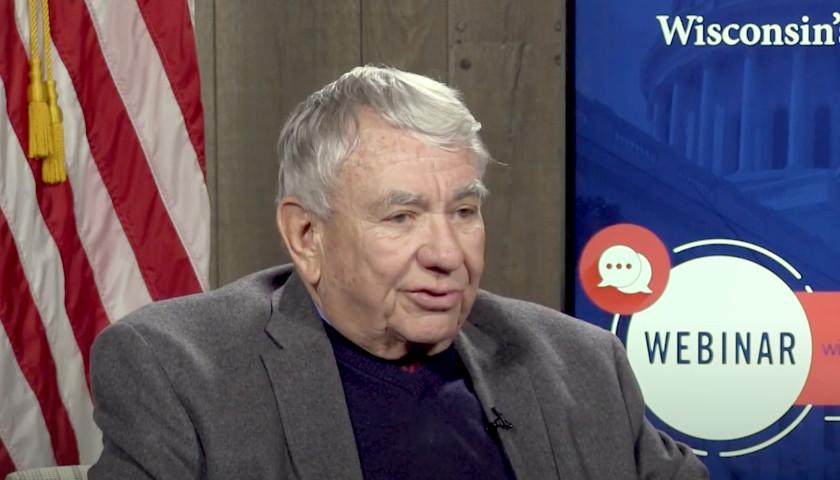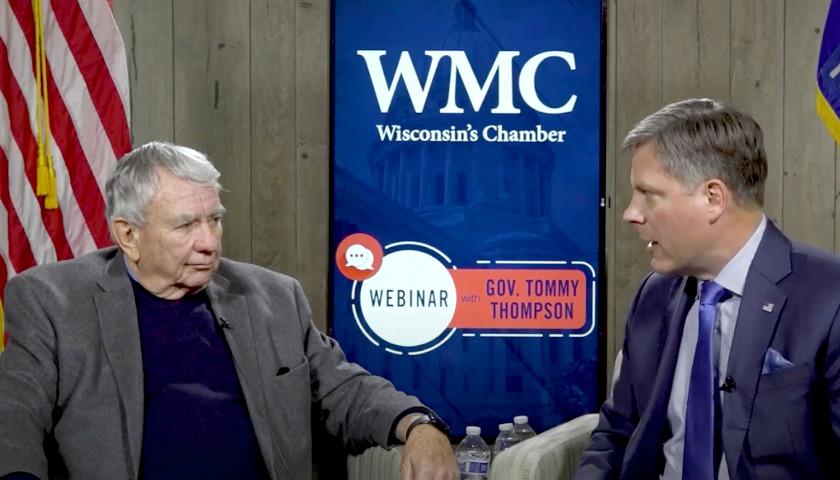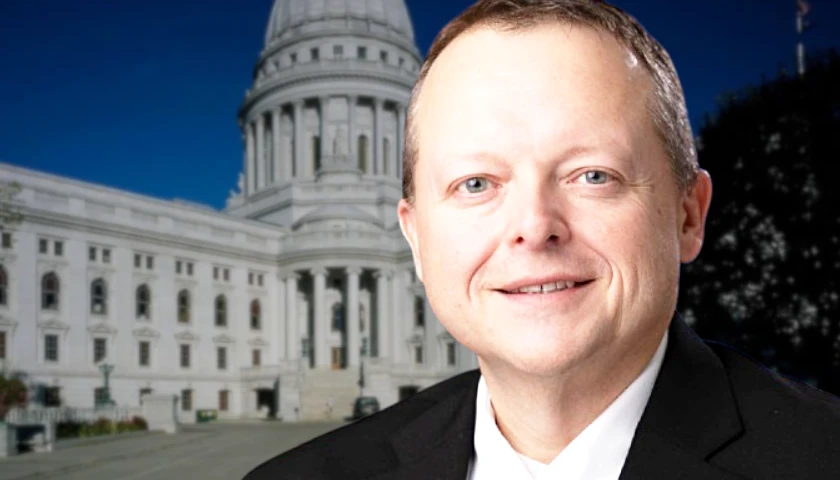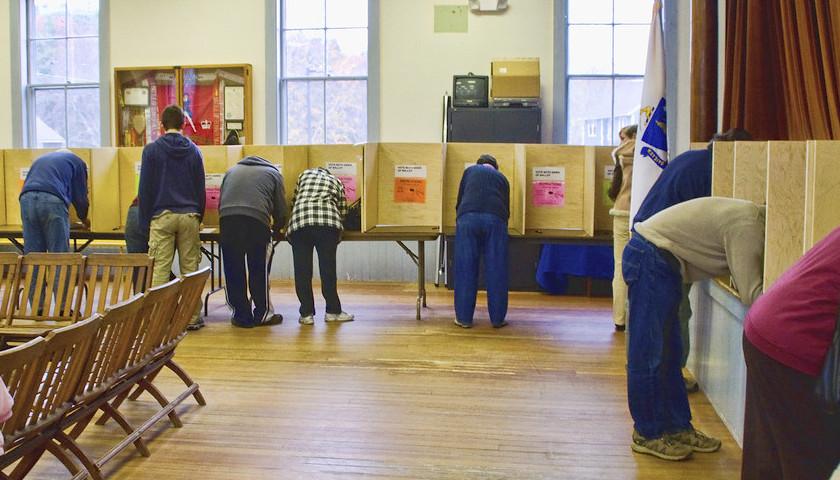Tommy Thompson, Wisconsin’s longest-serving governor and welfare reform pioneer, is lending his support for a work-first referendum question on the Badger State’s April 4 election ballot.
The non-bonding referendum asks voters a simple question: “Shall able-bodied, childless adults be required to look for work in order to receive taxpayer-funded benefits?”

Thompson, who wrote the book on welfare reform in the 1990s, said the answer is yes. He joined Wisconsin Manufacturers & Commerce CEO and President Kurt Bauer this week for a WMC webinar on the subject.
The advisory referendum does not have the effect of law, but Bauer said it will send a message to policymakers. Last session, liberal Governor Tony Evers vetoed several welfare reform bills passed by the Republican-controlled Legislature.
Among them, is a bill that would require the Wisconsin Department of Health Services to review Medicaid eligibility every six months. Another would require DHS to enforce federal work requirements in order for able-bodied adults without children to receive benefits in the state’s FoodShare program. One bill would bar publicly funded health care to able-bodied adults without dependents who fail to accept a paid job offer or an increase in work.
“I am vetoing this bill in its entirety because I object to adding more barriers for individuals applying for and receiving food security and economic assistance through programs largely designed to provide support when individuals and families are experiencing economic hardship,” Evers said in his veto message.
The Biden administration killed requests from Wisconsin seeking federal permission to expand work search and job training requirements for state-administered health care.
“I think the advisory amendment that’s on the ballot says it all,” Thompson said. “Let the people decide whether or not, if you’re capable, if you’re healthy, you should apply for work.”
Thompson’s Wisconsin Works, or W-2, the initiative is considered a pioneering piece of welfare legislation that became a national model for welfare reform. He signed the act into law in 1996. It replaced Wisconsin’s benefits-based system with one that required individuals to find work while providing money for both school and child care.
Thompson was a driving force behind then-President Bill Clinton’s political metamorphosis on welfare reform. Clinton, a Democrat, co-opted the Republican’s ideas in 1996, a re-election year.
It was Thompson, too, who proposed BadgerCare, the state’s publicly-funded healthcare benefits for low-income and disabled people. But the Republican’s health care initiative was to serve as a companion to his welfare reform measures, providing assistance as a transition to move able-bodied adults from welfare to work.
As of last month, there were more than 1.17 million people enrolled in BadgerCarePlus, a 15-fold increase from the 77,000 enrollees in 2000.
Thompson recalled the days in the 1980s and early 1990s when Wisconsin, a reputed generous welfare state, was a target of would-be public assistance seekers.
“There was a sign in a Greyhound Bus depot in Chicago, ‘Go to Milwaukee, sign up for welfare and you can live in Chicago,’ written up by the Wall Street Journal,” he said.
By 1997, the Wall Street Journal was reporting much had changed in the Badger State.
“Wisconsin has already won half the battle against welfare dependence–and is winning the other half with breathtaking speed,” the Journal’s Robert Rector wrote in a March 1997 piece headlined “Wisconsin Beats the Feds on Welfare Reform.”
“In the past 10 years, while national caseloads in the Aid to Families With Dependent Children program were rising steeply, Wisconsin’s AFDC caseload dropped by more than half. In inner-city Milwaukee, the caseload has fallen by 32%; in the rest of the state, caseloads have fallen by more than 70%. In 28 of Wisconsin’s 77 counties, the welfare rolls have already dropped by 80% or more. In Milwaukee, the AFDC caseload is now shrinking by 2% per month; in the rest of the state, it’s shrinking by 4% per month. Wisconsin’s decline in dependence is the most significant change in the 60-year history of AFDC,” the piece stated.
But there are growing concerns Wisconsin is becoming a destination welfare state under liberal Evers’ four-plus years in office. The governor has eschewed stricter controls on welfare eligibility signed into law by his predecessor, Republican Governor Scott Walker. And he’s unilaterally pushed actions through the executive branch to make it easier to collect public assistance benefits.
Critics say Evers’ welfare-friendly policies have exacerbated Wisconsin’s worker shortage crisis.
Wisconsin Manufacturers & Commerce’s latest employer survey found 85 percent of respondents said they can’t find the workers they need. Meanwhile, the state’s unemployment rate is at a record low 2.7 percent. Yet, Wisconsin’s labor participation rate, at 65.3 percent, is the lowest it’s been since 1976. Wisconsin is typically a top 5 state in high labor participation rate. It’s now out of the top 10, at a full percentage rate lower than pre-pandemic levels.
Thompson’s welfare reforms cut the state’s welfare rolls by nearly 90 percent. Perhaps not surprisingly, the state’s labor force participation rate peaked in the late 1990s, at nearly 75 percent.
“Wisconsin used to lead on this issue. We need to lead again. This used to be a nonpartisan issue. It needs to be again,” Bauer said.
– – –
M.D. Kittle is the National Political Editor for The Star News Network.
Photo “Tommy Thompson” by WMC TV.






Governor Thompson was “spot on accurate” with the W2 program, it removed many from the welfare roles. His other mantra was always “we will give you a hand up not a hand out”. There was an expectation that the able bodied would work or be fully engaged in a training program that would get them off public assistance. He made it a disincentive to not work, monthly benefits were reduced if the individual did not work. Length of time on public assistance was capped meaning there was a clear end date. Evers and his ilk just don’t get it. They promote dependence on government not independence from government. Many of their programs actually erode the family structure. Go Tommy! Thank you Sir..